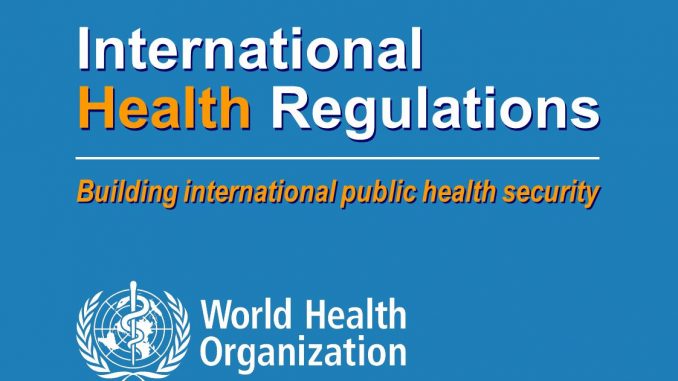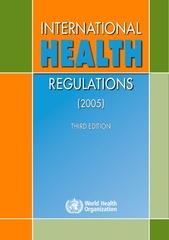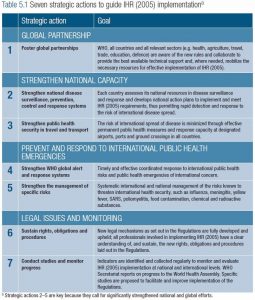
Table of Contents
What is International Health Regulations (IHR)?
- The International Health Regulations (IHR) are an international legal instrument that covers measures for preventing the transnational spread of infectious diseases.
- International Health Regulations (IHR) is an instrument of international law that is legally binding on countries.
- International Health Regulations (IHR) is a set of regulations that is legally binding upon 196 state parties.
- This legal binding is adopted by 196 countries, including all (194) WHO member states.
- International Health Regulations (IHR) is a benchmark to state the rights and obligations of countries to report public health actions.
- The objective of International Health Regulations (IHR) is to work together to protect global health security.
- International Health Regulations (IHR) are the international agreements with the objective of preventing the spread of public health threats without unnecessary impairment of international travel and trade.
- The International Health Regulations (IHR) was adopted by the 58th World Health Assembly in 2005 through Resolution WHA 58.3.
- International Health was in action since 15 June 2007.
Purpose and Scope of International Health Regulations (IHR):
IHR (2005) has a purpose and scope “to prevent, protect against, control and provide a public health response to the international spread of disease in ways that are commensurate with and restricted to public health risks, and which avoid unnecessary interference with international traffic and trade.”
Who is Responsible for Implementing International Health Regulations?
- The responsibility for implementing the IHR (2005) rests upon all States that are bound by the Regulations and WHO.
- The State is responsible, including all of its sectors, ministries, levels, officials and personnel for implementing the Regulations at the national level.
What are the Key Obligations for States (as per the International Health Regulations (IHR)?
States Parties to the IHR (2005) are required:
- to designate a National IHR Focal Point (see Question 4 above);
- to assess events occurring in their territory and to notify WHO of all events that may constitute a public health emergency of international concern using the decision instrument included in Annex 2 of the Regulations (see Question 5 above);
- to respond to requests for verification of information regarding events that may constitute a public health emergency of international concern;
- to respond to public health risks which may spread internationally;
- to develop, strengthen and maintain the capacity to detect, report and respond to public health events;
- to provide routine facilities, services, inspections and control activities at designated international airports, ports and ground crossings to prevent the international spread of disease;
- to report to WHO evidence of a public health risk identified outside their territory which may cause international disease spread, manifested by exported/imported human cases, vectors carrying infection or contamination, contaminated goods;
- to respond appropriately to WHO-recommended measures; and
- to collaborate with other States Parties and with WHO on IHR (2005) implementation.
How will Compliance with the IHR (2005) be Achieved?
- IHR (2005) do not include an enforcement mechanism per se (by itself) for States which fail to comply with its provisions. However, the potential consequences of non-compliance are themselves a powerful compliance tool.
- The best incentives for compliance are ‘peer pressure’ and public knowledge. States do not want to be isolated.
- The consequences of non-compliance may include a stained/tarnished international image, increased morbidity/mortality of affected populations, unilateral travel and trade restrictions, economic and social disruption and public outrage.
Advantages of International Health Regulations (IHR) :
- IHR provides an overarching legal framework that defines countries’ rights and obligations in handling /dealing with public health events and emergencies that have the potential to cross borders.
- IHR outlines the criteria to determine whether or not a particular event constitutes a “public health emergency of international concern”
- IHR contributes to global public health security.
- IHR introduce important safeguards to protect the rights of travelers and other persons: It protects the right of the travelers in relation to the treatment of personal data, informed consent and non-discrimination in the application of health measures under the Regulations.
- IHR is not limited to specific diseases/events, thus, it is very dynamic.
- IHR has long-lasting relevance in the international response to the emergence and spread of disease.
As per the IHR, there are Four (4) Diseases that Require Immediate Notification to WHO:
According to International Health Regulations (IHR) (2005), there are four diseases that require immediate notification to WHO in all circumstances.
These diseases are considered to be unusual, unexpected and may have serious public health impact, thus requires immediate notification to WHO:
- Smallpox
- Poliomyelitis due to wild-type poliovirus
- Human influenza caused by a new subtype
- Severe acute respiratory syndrome (SARS)
Apart from these 4 diseases, IHR (2005) also require notification of all (public health) events which may constitute a public health emergency of international concern (PHEIC).
Other Potentially Notifiable Events:
- May include cholera, pneumonic plague, yellow fever, viral hemorrhagic fever, and West Nile fever, as well as any others that meet the conditions brought up by the IHR.
- Other natural, radiological, or biochemical events that run into IHR conditions.
- Ever since the revised version of IHR was into action, WHO have declared five PHEICs:
- H1N1 influenza (2009)
- Polio (2014)
- Ebola (2014)
- Zika virus (2016)
- COVID-19 (2019)
- When WHO makes a declaration regarding PHEIC, it helps to coordinate immediate response with the affected country and other countries globally.
Declaration of Public Health Emergency of International Concern:
According to IHR (2005), the World Health Organization declares a PHEIC if it meets 2 of 4 conditions i.e.
- Is the public health impact of the event serious?
- Is the event unusual or unexpected?
- Is there a significant risk of international spread?
- Is there a significant risk of international restriction(s) to travel and trade?
If the event is dogged to be acceptable under the international health regulations, the country must alert WHO within 24 hours.
Benefits of International Health Regulations (IHR) to Member Countries:
By agreeing to be bound by the IHR (2005), States will:
- enjoy the benefits of a respected partner in the international effort to maintain international public health security;
- receive WHO guidance in building the core capacities necessary to quickly detect, report, assess and respond to public health emergencies and public health risks, including those of national and international concern;
- be offered technical assistance and receive help in efforts to mobilize possible funding support to meet these new obligations;
- receive WHO guidance during outbreak assessment and response;
- have access to specific information gathered by WHO about public health risks world-wide which is necessary for them to protect themselves;
- receive WHO advice and logistical support, when requested, to respond to disease outbreaks and other public health events; and
- have access to the Global Outbreak Alert and Response Network (GOARN), a ‘one-stop shop’ of global resources to help manage public health risks and emergencies of international concern.
Additionally, within a framework of partnership and collaboration, member states benefit from IHR by:
- Improving national and international surveillance
- Building on the current WHO system to detect and quickly respond to public health risks and emergencies of international concern
- Encouraging the use of modern communication tools
- Recognizing that disturbances to international traffic constitute an obstacle to reporting and that mechanisms to counter this interference need to be developed
- Having a set of generic rules to evaluate and resolve different kinds of urgent events
- Developing mechanisms to provide national and local protection within a set of rules which enjoy a broad consensus among all WHO Member States
WHO’s Support for Implementation of International Health Regulations (IHR):
WHO provides adequate support, guidance, tool and training for implementing IHR. WHO’s support focuses on the priority needs identified by the WHO Regional and Country Offices. Support provided by WHO for IHR implementation are:
- Designating WHO IHR Contact Points at the headquarters or the regional level;
- Conducting global public health surveillance and assessment of significant public health events;
- Disseminating public health information to Member States;
- Offering technical assistance to Member States;
- Supporting Member States in their efforts to assess their existing national public health structures and capacities for surveillance and response, including at designated points of entry;
- Monitoring the implementation of IHR (2005) and updating guidelines; and
- If required, determining whether or not a particular event constitutes a public health emergency of international concern (PHEIC), with advice from external experts.
Note: If a Public Health Emergency of International Concern (PHEIC) is declared, WHO develops and recommends the critical health measures for implementation by Member States during such an emergency.
Seven Areas of Work for Implementation of International Health Regulations:
Implementing IHR and meeting its requirements are challenging tasks for any nation. There are set of seven strategic actions that should be followed by WHO and other countries to guide the IHR implementation.
The seven areas of work (to support countries with challenges) for IHR (2005) implementation:
- Foster global partnerships
- Strengthen national disease prevention, surveillance, control and response systems
- Strengthen public health security in travel and transport
- Strengthen WHO global alert and response systems
- Strengthen the management of specific risks
- Sustain rights, obligations and procedures
- Conduct studies and monitor progress

What does International Health Regulations (IHR) require?
IHR requires that all countries have the ability to do the following:
- Detect the event: Make sure surveillance systems can detect acute public health events/potential threats in timely matter.
- Assess: Work together with other countries to make decisions in public health emergencies
- Report: Report specific diseases, plus any potential international public health emergencies, through participation in a network of National Focal Points
- Respond: Respond to public health risks and emergencies.
Note: Use the decision instrument in Annex 2 of the IHR to assess public health event and report to WHO through their National IHR Focal Point those that may constitute a public health emergency of international concern.
How to Assess Health Security Capacity of a Country?
IHR (2005) Monitoring and Evaluation Framework (MEF) provides a roadmap for assessing a country’s health security capacity, enabling them to identify areas for improvement.
IHR MEF is composed of four processes:
- States Parties Self-Assessment Annual Reporting (SPAR),
- Joint External Evaluations, (JEE),
- After Action Reviews (AAR), and
- Simulation Exercises (SimEx).
Who are the Members of the IHR Committee?
- The member of IHR is point out from IHR Experts Roster where the professionals are proficient in the field of disease control, virology, vaccine improvement or infectious disease epidemiology and from WHO expert advisory panels by the Director-general.
- Similarly, the members can be recruited based on the expertise required for a specific task.
- Nonetheless, an expert also a single member of the Emergency Committee, mandatorily be nominated by a State Party in the interior, whose terrain the event arises.
- These States Parties present their views to the Emergency Committee and the Director-General may appoint 1 or more technical experts to advise the Committee, for his or her own advantage or at the appeal of the Committee.
- Persons who are neither members of the IHR Experts Roster nor other WHO Expert Advisory Panels may be hired as technical experts to counsel the Committee, but not as members of the Committee.
- The names of members and advisers to an IHR Emergency Committee, their job titles and any other information that could be a possible conflict of interest.
How do IHR Committee Work?
- IHR focuses on decreasing the severity of public health threats in different parts of the world.
- IHR committee is a valuable asset that detects and report events that might consist of hazardous threat and public health emergency of international concern.
- IHR countries and WHO coordinate with each other as a team at the international level, with a commitment to upgrade preventive measures and control measures to combat global health threats.
- The coordination targets to keep the world up-to-date about public health phenomena.
- The IHR obliges its member states and all countries to develop the capacity to follow the requirement i.e.
- Detection of possible health threats through strong surveillance systems and laboratories
- Strong partnership with fellow countries to create resolutions in Public Health difficulties.
- Effecting Reporting system on a certain disease that has potential global public health emergencies, through involvement in a link of National Focal Points.
References and For More Information:
https://www.who.int/ihr/about/faq/en/#faq04
https://www.who.int/health-topics/international-health-regulations#tab=tab_1
https://www.who.int/ihr/capacity/case_definitions/en/
https://www.who.int/westernpacific/activities/implementing-the-international-health-regulations
http://www.emro.who.int/health-topics/international-health-regulations/index.html
https://www.who.int/publications/i/item/9789241580496
https://www.cdc.gov/globalhealth/healthprotection/ghs/ihr/index.html
https://www.tandfonline.com/doi/full/10.1080/13523260.2020.1771955
https://www.who.int/ihr/revisionprocess/revisionchange/en/
https://www.paho.org/en/international-health-regulations-ihr
https://globalizationandhealth.biomedcentral.com/articles/10.1186/s12992-020-00600-4
https://www.thelancet.com/journals/lancet/article/PIIS0140-6736(20)30373-1/fulltext
https://academic.oup.com/jtm/article/27/8/taaa127/5880460